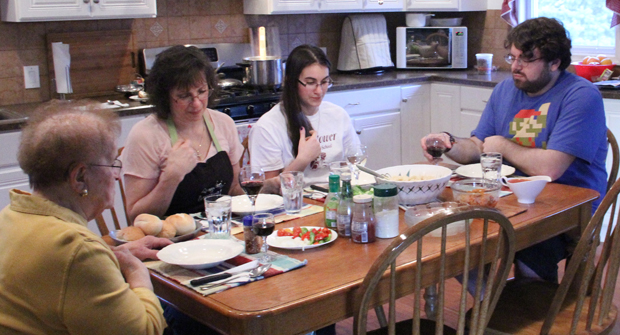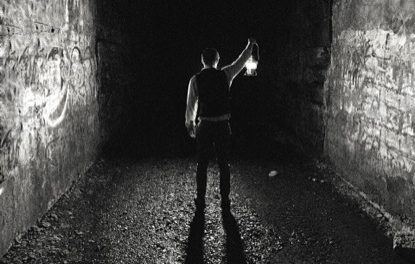This is a guest post by Julie Hanlon Rubio. She is professor of Christian Social Ethics at the Jesuit School of Theology of Santa Clara University in Berkeley, CA and the author of Family Ethics: Practices for Christians.
When the shelter in place order from California Governor Newsom came down, like most people, I gathered my loved ones, shopped for supplies, and prepared my household for weeks at home. In my professional life, I write about family and social ethics, about solidarity, the common good, and the option for the poor and vulnerable. During this crisis, I have been wrestling with why it is so difficult for us to embrace the sacrifices we need to make for each other. I don’t mean to single out those who remained in the bars, at the beach, or other public spaces for far too long. I am also talking about myself.
My family and I have been practicing social distancing, following and adopting the changing advisories. With friends and colleagues, I am frustrated with the failure of others to do the same. From inside my home, I wonder, how many others continue to go out? Will their actions contribute to the continuing crisis, as the health care system becomes overwhelmed, supplies dwindle, and available hospital beds disappear. The prospect of people needing respirators to breathe but not having them terrifies me.
But the afternoon of the order, though my pantry was far from empty, I went the grocery store. Scanning the shelves and standing in long lines too close to my neighbors, for the first time, I felt afraid. I walked around in a daze. What did we need? What couldn’t we go without? What would disappear before I could buy it again? Was there an alternative to toilet paper? Should I buy one loaf of bread or two? Fresh produce or dried rice and beans? How much could I fit in my backpack?
I left the store without several items I needed and walked hurriedly down the street, calculating that I could make it to another local store before they closed. I suddenly realized that I had walked right by a homeless woman sitting on the street who had spoken to me. Half way down the street, I stopped. I am teaching about street homelessness in my social ethics class right now. We are studying the enormity of this complex problem beginning with our own context in Berkeley-Oakland. I stood frozen in place for a good minute. What was I doing? Who was I?
I turned around and walked back, asked the woman if she had a place to stay that night, and gave her some money. I walked on, feeling the weight of my impulse to care for my own. I don’t think that there is a moral duty to give to everyone who asks. In many contexts, that would be difficult, and if we extend “asks” to the mailbox and inbox, impossible. And yet something in my own attitude shook me. Thinking about the safety of my husband and three young adult sons, I suddenly understood the impulse to hoard things that had emptied the shelves before I arrived, even though I know that there is no food shortage in the U.S.
If we share, there will be enough for everyone.
It sounds easy enough. Once I caught myself, I reset my approach to supplies, buying only what we needed for a week or so. Today, after many unsuccessful tries, I was able to order packages of the elusive toilet paper and disinfectant wipes. They will arrive next week from a local store, through a delivery app. We are in contact with the neighbors via email, promising each other to stay inside as much as possible, and vowing to help if anyone gets sick. My husband and I are teaching our students online, and my son is dealing well with the unexpected situation of completing his senior year of college from behind a screen in a bedroom in his parents’ home.
But the other day I was walking in my neighborhood and a man I didn’t recognize asked me if I had seen the construction on a large house on the street. “I didn’t notice,” I said, lost in my thoughts. Surprised, he asked, “Do you live in a big house around here?” “No,” I said, “we have a small house.” This is true, but that wasn’t his point. I had grown used to large houses that surround me in the beautiful Berkeley Hills. This small city’s 2000 homeless people live mostly in “the flats” down below.
Homelessness is more complicated than square footage, but it seems important to note, as did Pat Jones in the new collection, Street Homelessness and Catholic Theological Ethics, that in England and Wales, “We now have more housing than we have ever had before, per person and per family. We just share it more unfairly than we have ever done before.” I suspect the same is true in Berkeley, where some of us use mobile showers to keep clean while sleeping outside while others have way more space than we need. Currently, the state is scrambling to find hotel rooms for people living on the streets in an effort to stop the spread of COVID19. But housing for all will be short lived.
If we share, there will be enough for everyone.
I am grateful for the way Christianity calls me to think beyond my own family, for the way Jesus extended family beyond blood ties (Mark 3:32-35, Mark 10: 29-30, Luke 14:26), for Catholic social thought’s emphasis on the universal destination of the goods of the earth which were created by God and intended for all, the limited nature of private property, and the scope of human rights which necessarily imply limits on what we may keep for “our own. ”
Right now, this call of the Christian tradition feels both truer and more difficult than ever. Some people are getting it right: a first responder working at a drive-through testing site, when asked why she was showing up despite the risk, who said that as a nurse she couldn’t not be there; and a mother who is stretching her family’s food supply by going without so her kids can eat. These two women are not confused. They know exactly who they are, in and outside their homes, and point the way for the rest struggling to remember that we belong to each other.




